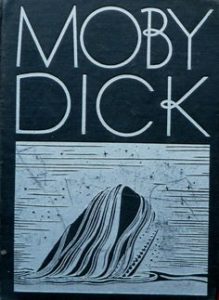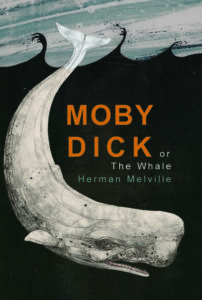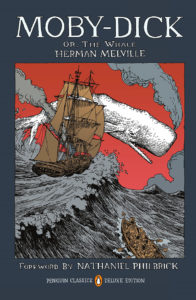*

“This is an ill-compounded mixture of romance and matter-of-fact. The idea of a connected and collected story has obviously visited and abandoned its writer again and again in the course of composition. The style of his tale is in places disfigured by mad (rather than bad) English; and its catastrophe is hastily, weakly, and obscurely managed … The result is, at all events, a most provoking book,—neither so utterly extravagant as to be entirely comfortable, nor so instructively complete as to take place among documents on the subject of the Great Fish, his capabilities, his home and his capture. Our author must be henceforth numbered in the company of the incorrigibles who occasionally tantalize us with indications of genius, while they constantly summon us to endure monstrosities, carelessnesses, and other such harassing manifestations of bad taste as daring or disordered ingenuity can devise…
We have little more to say in reprobation or in recommendation of this absurd book … Mr. Melville has to thank himself only if his horrors and his heroics are flung aside by the general reader, as so much trash belonging to the worst school of Bedlam literature—since he seems not so much unable to learn as disdainful of learning the craft of an artist.”
–Henry F. Chorley, London Athenaeum, October 25 1851

“Of all the extraordinary books from the pen of Herman Melville this is out and out the most extraordinary. Who would have looked for philosophy in whales, or for poetry in blubber. Yet few books which professedly deal in metaphysics, or claim the parentage of the muses, contain as much true philosophy and as much genuine poetry as the tale of the Pequod’s whaling expedition … To give anything like an outline of the narrative woven together from materials seemingly so uncouth, with a power of thought and force of diction suited to the huge dimensions of its subject, is wholly impossible … [Readers] must be prepared, however, to hear much on board that singularly-tenanted ship which grates upon civilized ears; some heathenish, and worse than heathenish talk is calculated to give even more serious offence. This feature of Herman Melville’s new work we cannot but deeply regret. It is due to him to say that he has steered clear of much that was objectionable in some of his former tales; and it is all the greater pity, that he should have defaced his pages by occasional thrusts against revealed religion which add nothing to the interest of his story, and cannot but shock readers accustomed to a reverent treatment of whatever is associated with sacred subjects … [T]he artist has succeeded in investing objects apparently the most unattractive with an absorbing fascination. The flashes of truth, too, which sparkle on the surface of the foaming sea of thought through which the author pulls his readers in the wake of the whale-ship,—the profound reflections uttered by the actors in the wild watery chase in their own quaint forms of thought and speech,—and the graphic representations of human nature in the startling disguises under which it appears on the deck of the Pequod,—all these things combine to raise The Whale far beyond the level of an ordinary work of fiction. It is not a mere tale of adventures, but a whole philosophy of life, that it unfolds.
–London John Bull, October 25, 1851

